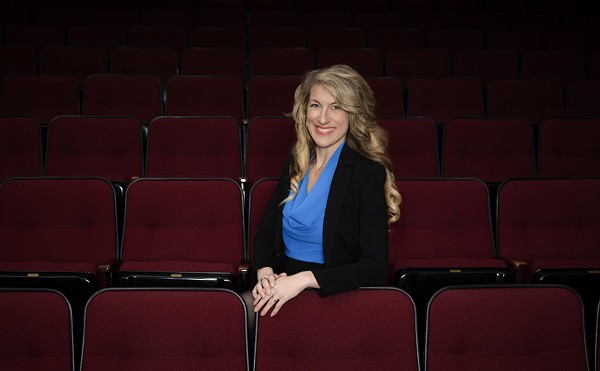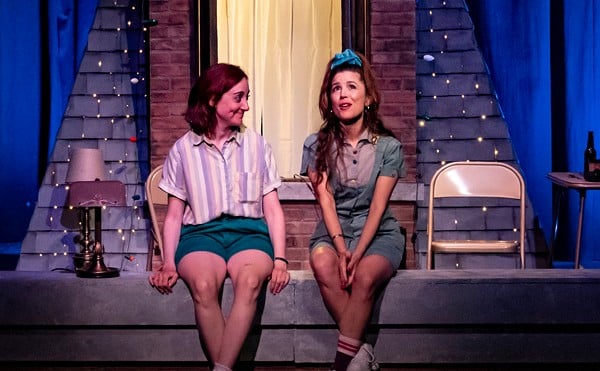Almost everyone in Humble Boy has a counterpart in Hamlet. (Humble and Hamlet even share four letters.) Flora Humble, whose beekeeping husband has recently died, is the Queen Bee stand-in for the grieving Gertrude. Her unctuous boyfriend George is a Claudius-like secret lover who has "been waiting in the wings" to marry Flora. George's daughter Rosie is a sadder but wiser Ophelia.
If you've ever wondered — and who hasn't? — how a young Michael Palin might have portrayed Hamlet, here's your opportunity to find out. In the title role, Chris Hietikko reminds one of Palin's stuttering Ken in A Fish Called Wanda, here abetted by a mischievous dash of Dylan Thomas. If Felix wears his frailties like merit badges, Anderson Matthews' George is all veneer and polish and as persuasively phony as a movie set façade.
But playwright Jones is not content merely to hold the mirror up to Hamlet. Humble Boy pays homage to centuries of British theater. With a wine glass clenched in her left hand, a cigarette dangling from her right, Patricia Hodges' fashion plate Flora is a willowy incarnation of the quintessential Noel Coward heroine. Mercy, the insipid family friend amusingly performed by Carolyn Swift, is a steal from Oscar Wilde. Rachel Fowler's plaintive Rosie is a refugee from the kitchen-sink world of John Osborne.
Their coruscating world is more Eden than Elsinore, as the enticing red apples hanging from an orchard tree make all too clear. Scenic designer John Ezell has designed a voluptuously overgrown rose garden that instantly establishes the universe for this tale of a family whose domestic affairs need weeding. (The snazzy croquet mallets just offstage indicate Ezell's attention to detail.) Elizabeth Covey's costumes also add to the production's texture. From ill-fitting suits to body-hugging gowns, every piece of clothing reflects the characters' mindsets. There's almost a sense that the show has been conducted by Steven Woolf rather than directed, so smooth is its flow, and so in harmony are the performances with the subtle yet evocative lighting design by Mary Jo Dondlinger.
By night's end, a play that begins with the news of death and disappearance is revealed as a resounding affirmation of life and restoration. Throw in a sense of wonder and mystery, maybe even a ghost, and you have a story strangely familiar yet also unique. But with so much being done so right, it's a shame, it's a downright shame, that the playwright feels a need to say everything twice. A viewer might well wish that Jim, the gardener (Dane Knell, a fine actor, who is saddled with the script's most maddeningly overwritten speech), would take his pruning shears to the text. But not even this writing tic can wound the exemplary production — though it does make you wonder why so many playwrights today are so out of touch with their audiences. Don't they attend performances? Don't they sense when viewers grow restless? Don't they care?
"I can't go in until I find the right words," Felix says in the opening scene. Then he and his family are forced to repeat the right words far too many times. How unfortunate; how unfortunate. Because this enchanted evening of civility and intelligence embodies the Rep at its rare best — and the Rep at its rare best is on a par with the best theater anywhere.





